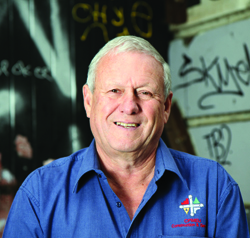 Tommy’s work history reads like a map of Melbourne’s industrial heartland in the west. He worked in the Altona petrochemical plant before being transferred to the West Gate Bridge. He worked there for nine months before the collapse and returned in 1972 when work resumed.
Tommy’s work history reads like a map of Melbourne’s industrial heartland in the west. He worked in the Altona petrochemical plant before being transferred to the West Gate Bridge. He worked there for nine months before the collapse and returned in 1972 when work resumed.
He credits the experience of working on the bridge as producing a whole generation of union activists – some of whom went on to become officials.
‘Danny Gardiner, Pat Preston, John Cummins and John McPartlin are just a few of the men who worked on the project and went on to play significant roles in the union movement.’
He believes that the employer’s insistence that the bridge was safe when it wasn’t and the disastrous consequences of that led to a pronounced militancy of workers.
‘When work resumed on the bridge we had to go on strike for seven weeks to get shop stewards on the job. But the support was there, because people realised that left to their own devices, bosses couldn’t be trusted to do the right thing.’
Tommy’s first job as a union official was with the Federated Ironworkers Association. He was one of the leaders of the famous ‘Sit in’ campaign for a 35 hour week at the Altona petrochemical plant.
‘Fifty one days that campaign lasted. It was the biggest dispute the state had ever seen. Two thousand workers were involved and six unions. We had Christmas on the picket line.’
In 1990 he headed a ticket to take over the union and lost by a few hundred votes. Valued for his experience and skills as a union official, he was quickly snapped up by the FEDFA which later merged with other unions to form the CFMEU.
Tommy considers himself lucky that he was able to spend so many years helping working people.
‘I have always loved my job. Despite the heartache and stress that is part of it, I wouldn’t change a thing.’
Tommy believes that the challenges ahead for the union movement are many. He concedes that it’s harder now for unions than it was 20 or 30 years ago.
‘Unions must stay relevant and keep core values. We have to look after our members’ social problems too. It’s not just about representing them on the job. Unions will always have a role because someone has to be in there batting for the worker. And no one does this better than the union,’ Tommy said.
Tommy retired from the CFMEU in 2011.
